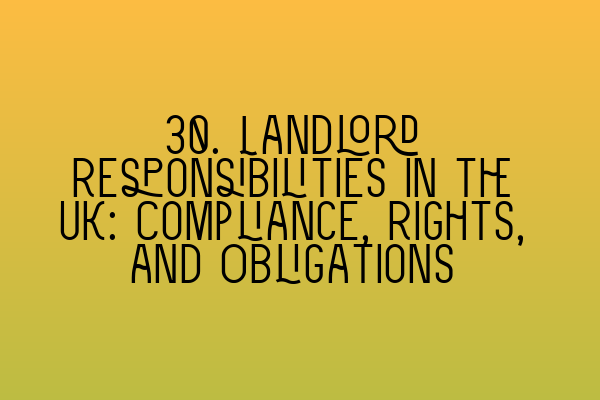Landlord Responsibilities in the UK: Compliance, Rights, and Obligations
Are you a landlord in the UK? If so, it’s crucial to familiarize yourself with your responsibilities, rights, and obligations to ensure compliance with the law. Understanding these key elements will not only help you maintain a positive relationship with your tenants but also protect your investment. In this blog post, we will explore the essential aspects of landlord responsibilities in the UK.
1. Providing a Safe Living Environment
As a landlord in the UK, one of your primary responsibilities is to provide a safe and habitable living environment for your tenants. This includes ensuring that the property is structurally sound, with working utilities and safety measures such as smoke detectors and carbon monoxide alarms. Regular inspections should be carried out to identify any potential issues and address them promptly.
2. Maintaining the Property
Maintenance is another critical aspect of landlord responsibilities. It is your obligation to keep the property in good repair, both structurally and aesthetically. This includes addressing any issues with plumbing, electrical systems, heating, and ventilation. Regular inspections can help identify maintenance needs and prevent them from becoming major problems.
3. Ensuring Compliance with Health and Safety Regulations
Landlords in the UK must adhere to various health and safety regulations. Failure to comply with these regulations can lead to serious consequences, including fines and legal action. It is essential to stay updated on the current regulations, such as the Gas Safety (Installation and Use) Regulations 1998 and the Electrical Safety Standards in the Private Rented Sector (England) Regulations 2020.
4. Conducting Right to Rent Checks
Under the Immigration Act 2014, landlords in the UK have an obligation to conduct right to rent checks on their tenants. These checks are designed to verify the immigration status of prospective tenants and prevent the rental of properties to those with no legal right to reside in the UK. It is crucial to familiarize yourself with the specific requirements and carry out these checks diligently.
5. Protecting the Tenant’s Deposit
As a landlord, you have a legal obligation to protect your tenant’s deposit in a government-approved tenancy deposit scheme. This ensures that the deposit is safeguarded and can be returned to the tenant at the end of the tenancy, minus any deductions for damages or outstanding rent. Failure to comply with these requirements can result in financial penalties.
6. Providing Proper Notice and Access
When it comes to accessing the property, landlords must provide appropriate notice to their tenants. Generally, 24 hours’ notice is considered reasonable, except in cases of emergency. It is also crucial to respect the tenant’s right to privacy and ensure that access is granted in a manner that is convenient and considerate.
7. Protecting Against Discrimination
Landlords have a legal obligation not to discriminate against tenants based on protected characteristics, such as race, gender, religion, disability, or sexual orientation. It is essential to familiarize yourself with the Equality Act 2010 and ensure that your property advertisements, tenant selection processes, and management practices do not violate these anti-discrimination laws.
8. Complying with Tenancy Deposit Protection Schemes
In addition to protecting the tenant’s deposit, it is crucial to comply with the requirements of tenancy deposit protection schemes. These schemes are designed to resolve any disputes regarding the return of the deposit and provide an impartial adjudication process. Familiarize yourself with the specifics of the scheme you are using to ensure compliance.
9. Evictions and Ending Tenancies
Sometimes, circumstances arise where you may need to end a tenancy or evict a tenant. It is essential to follow the proper legal procedures and seek professional advice if necessary. Familiarize yourself with the relevant legislation, such as the Housing Act 1988 and the Coronavirus Act 2020, which introduced temporary amendments to eviction procedures due to the COVID-19 pandemic.
10. Seeking Legal Advice
Navigating landlord responsibilities can be complex, and it is advisable to seek legal advice when necessary. Solicitors specializing in property law can offer guidance on various aspects of landlord obligations, help draft tenancy agreements, and ensure compliance with the law. If you require legal assistance, our team at SQE Property Law & Land Law is here to help.
Conclusion
Being a landlord in the UK comes with a range of responsibilities, rights, and obligations. From providing a safe living environment and maintaining the property to complying with health and safety regulations and protecting tenants’ rights, understanding and fulfilling these responsibilities is crucial. By staying informed about the relevant legislation, seeking legal advice when necessary, and maintaining open communication with your tenants, you can ensure a positive and successful landlord-tenant relationship.
Related Articles:
– SQE 1 Practice Exam Questions
– SQE 1 Practice Mocks FLK1 FLK2
– SQE 2 Preparation Courses
– SQE 1 Preparation Courses
– SRA SQE Exam Dates
